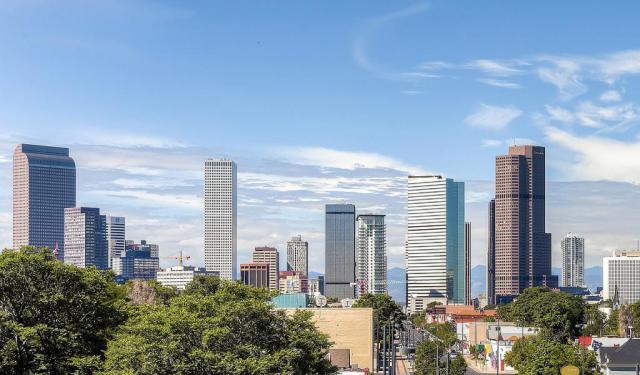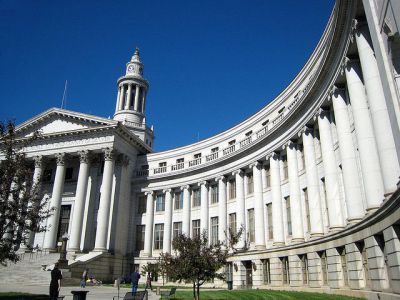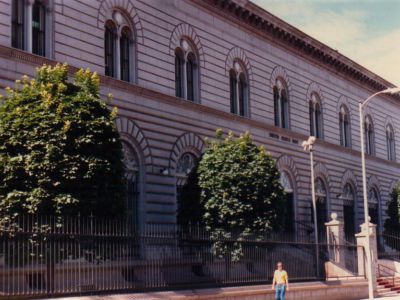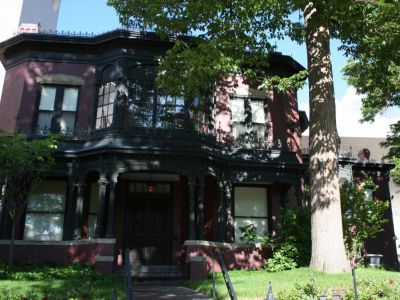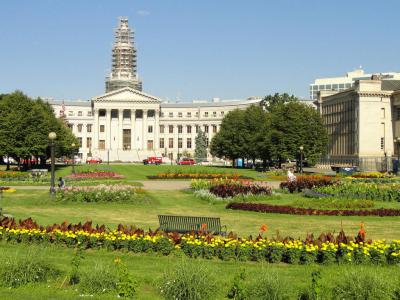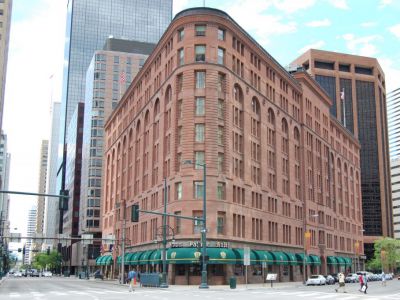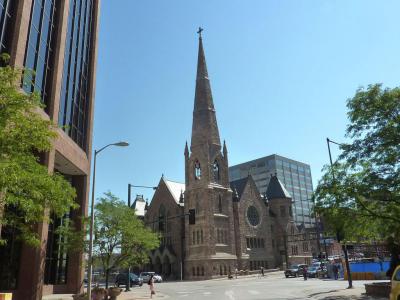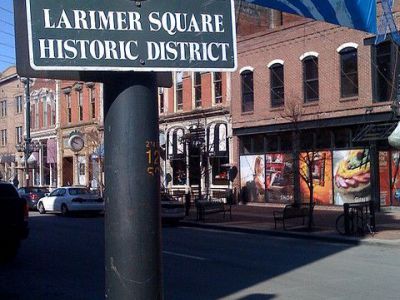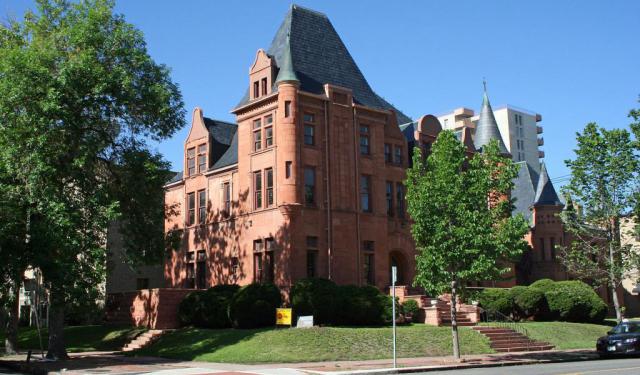Denver Downtown Walking Tour (Self Guided), Denver
Denver is the capital city of Colorado as well as the state's largest metropolitan area. Known colloquially as the "Mile High City," Denver is just as well known for its beauty as it is for its important place in the history of the United States.
Denver owes its origins to the Pikes Peak Gold Rush of 1858. General William Larimer claimed the area that would later become Denver and named it after James W. Denver, who was governor of the Territory of Kansas. Denver City, as it was known, quickly became a booming frontier town that catered to the incoming miners even before Colorado Territory was created.
A rail station was established in the city in 1870, which led to rapid growth. Millionaires like Horace Tabor flocked to Denver to build large mansions and hotels, some of which continue to stand today.
Since its early days as a frontier settlement, Denver has become known for its culture, love of the arts and tourism. Winter sports bring over 31 million visitors to the city every year. Take this self guided walking tour to explore the city on foot and see such places as the US Mint Denver Facility, the Colorado State Capitol, Byers-Evans House Museum, 16th Street Mall and, the birthplace of Denver, Larimer Square.
Denver owes its origins to the Pikes Peak Gold Rush of 1858. General William Larimer claimed the area that would later become Denver and named it after James W. Denver, who was governor of the Territory of Kansas. Denver City, as it was known, quickly became a booming frontier town that catered to the incoming miners even before Colorado Territory was created.
A rail station was established in the city in 1870, which led to rapid growth. Millionaires like Horace Tabor flocked to Denver to build large mansions and hotels, some of which continue to stand today.
Since its early days as a frontier settlement, Denver has become known for its culture, love of the arts and tourism. Winter sports bring over 31 million visitors to the city every year. Take this self guided walking tour to explore the city on foot and see such places as the US Mint Denver Facility, the Colorado State Capitol, Byers-Evans House Museum, 16th Street Mall and, the birthplace of Denver, Larimer Square.
How it works: Download the app "GPSmyCity: Walks in 1K+ Cities" from Apple App Store or Google Play Store to your mobile phone or tablet. The app turns your mobile device into a personal tour guide and its built-in GPS navigation functions guide you from one tour stop to next. The app works offline, so no data plan is needed when traveling abroad.
Denver Downtown Walking Tour Map
Guide Name: Denver Downtown Walking Tour
Guide Location: USA » Denver (See other walking tours in Denver)
Guide Type: Self-guided Walking Tour (Sightseeing)
# of Attractions: 10
Tour Duration: 2 Hour(s)
Travel Distance: 3.7 Km or 2.3 Miles
Author: DanaOffice
Sight(s) Featured in This Guide:
Guide Location: USA » Denver (See other walking tours in Denver)
Guide Type: Self-guided Walking Tour (Sightseeing)
# of Attractions: 10
Tour Duration: 2 Hour(s)
Travel Distance: 3.7 Km or 2.3 Miles
Author: DanaOffice
Sight(s) Featured in This Guide:
- Denver City Hall
- US Mint Denver Facility
- Byers-Evans House Museum
- Denver Civic Center Park
- Colorado State Capitol
- Brown Palace Hotel
- Trinity United Methodist Church
- 16th Street Mall
- Daniels & Fisher Tower
- Larimer Square
1) Denver City Hall
The Denver City Hall is one of the most unique city hall buildings in the country. Its neoclassical architecture is made evident by the massive columns and great bronze entry way. Taking inspiration from ancient Roman style, the Denver City Hall building has the visage of a temple that greets tourists and residents as they walk by.
The City Hall, also known as the City and County Building, is located in the center of Denver. It faces Civic Center Park with a direct view of the State Capitol. It is an easy stroll from nearby locations, such as the US Mint, the Civic Center, the Denver Art Museum and the Center for Colorado Women's History.
The building is beautiful any time of the year, but it is especially gorgeous during the holiday season when it is brightly decorated with festive lights. Throughout the year, visitors can plan pleasant walks through the Golden Triangle Creative District, which passes directly by the Denver City Hall.
The City Hall, also known as the City and County Building, is located in the center of Denver. It faces Civic Center Park with a direct view of the State Capitol. It is an easy stroll from nearby locations, such as the US Mint, the Civic Center, the Denver Art Museum and the Center for Colorado Women's History.
The building is beautiful any time of the year, but it is especially gorgeous during the holiday season when it is brightly decorated with festive lights. Throughout the year, visitors can plan pleasant walks through the Golden Triangle Creative District, which passes directly by the Denver City Hall.
2) US Mint Denver Facility
Touring Denver is not complete without a tour of the US Mint. Located near Civic Center Park, the US Mint Denver Facility is interesting both inside and out.
The institution itself is one of the city's oldest. Gold was first discovered in the state in 1858. Only four years later a US Mint was established in Denver. The facility opened the following year as an assay office, moving to its current location in 1904. It was added to the National Register of Historic Places in 1972.
Visitors ages seven and older are welcome on the free tour when the US Mint is open. Advance tickets are not available and they are only offered on a first-come, first-served basis. Tourists can learn about the minting process while also admiring the interior of the facility.
Even those who do not enter the US Mint can enjoy walking around the periphery of the building. It was designed by James Knox Taylor in 19th and 20th Century Revival Architectural styles. The building has been featured in television and on movies, such as the Sylvester Stallone film, "Cliffhanger." It is interesting to note that the US Mint Denver Facility is the single largest producer of coins in the world.
The institution itself is one of the city's oldest. Gold was first discovered in the state in 1858. Only four years later a US Mint was established in Denver. The facility opened the following year as an assay office, moving to its current location in 1904. It was added to the National Register of Historic Places in 1972.
Visitors ages seven and older are welcome on the free tour when the US Mint is open. Advance tickets are not available and they are only offered on a first-come, first-served basis. Tourists can learn about the minting process while also admiring the interior of the facility.
Even those who do not enter the US Mint can enjoy walking around the periphery of the building. It was designed by James Knox Taylor in 19th and 20th Century Revival Architectural styles. The building has been featured in television and on movies, such as the Sylvester Stallone film, "Cliffhanger." It is interesting to note that the US Mint Denver Facility is the single largest producer of coins in the world.
3) Byers-Evans House Museum (must see)
The Byers-Evans House Museum is a Late Victorian home that has since been converted into a museum. This must-see site was built in 1883 by William Byers. Later, it served as a home to Anne Evans, who was known as a prominent arts patron. In fact, Evans was instrumental in the founding of the Denver Art Museum, the Denver Public Library and the Central City Opera.
The house is now owned by the Colorado Historical Society and operated by History Colorado. Located directly behind the Denver Art Museum, the Byers-Evans House Museum is open for guided tours. The house is also home to the Center for Colorado Women's History.
The home was built in an Italianate style and added to over the years. The restoration project, which was begun in 1981, restored the home to the way it looked at the turn of the 20th century. Approximately 90 percent of the house and museum's contents are original belongings of those who previously lived in the home.
Lucky tourists may find that their visit to the Byers-Evans House Museum coincides with one of the many special events that occur onsite. Some of these include book club meetings, writing lessons and cultural events.
Why You Should Visit:
The Byers-Evans House Museum is an important part of the city's history. It also offers insight into the important influence women have had in local culture.
Tips:
The home is an easy walk from the Denver Art Museum, but visitors should still call in advance to ensure the house is open as there are no self-guided tours. The cost is $8 for adults, $6 for students and seniors, $4 for children under the age of seven and free for members of the military and History Colorado.
The house is now owned by the Colorado Historical Society and operated by History Colorado. Located directly behind the Denver Art Museum, the Byers-Evans House Museum is open for guided tours. The house is also home to the Center for Colorado Women's History.
The home was built in an Italianate style and added to over the years. The restoration project, which was begun in 1981, restored the home to the way it looked at the turn of the 20th century. Approximately 90 percent of the house and museum's contents are original belongings of those who previously lived in the home.
Lucky tourists may find that their visit to the Byers-Evans House Museum coincides with one of the many special events that occur onsite. Some of these include book club meetings, writing lessons and cultural events.
Why You Should Visit:
The Byers-Evans House Museum is an important part of the city's history. It also offers insight into the important influence women have had in local culture.
Tips:
The home is an easy walk from the Denver Art Museum, but visitors should still call in advance to ensure the house is open as there are no self-guided tours. The cost is $8 for adults, $6 for students and seniors, $4 for children under the age of seven and free for members of the military and History Colorado.
4) Denver Civic Center Park
The Denver Civic Center Park is located directly in the center of the city. Whether visiting the Mile-High City for work or pleasure, it is easy to find this vast, green space in the midst of Colorado's art and history hub.
The park on its own is a beautiful spot to relax, meet with friends, enjoy an outdoor picnic or go for a walk. The 25,000 square foot park is filled with green grass, blooming flowers, and stately trees.
Within the park is the Voorhies Memorial, built in 1919 in honor of miner John Hart Pemberton Voorhies. There are also art installations, like the statues Bronco Buster and On the War Trail, crafted by Alexander Phimster Proctor.
The Greek Ampitheatre is a favorite feature of the Civic Center Park. Like the Voorhies Memorial, it was designed and built in 1919. The ampitheatre was created to reflect ancient Greek architecture and includes event seating and gorgeous murals.
The Civic Center Park is a quick walk between the Carnegie Libarary/McNichols Civic Center Building, the Colorado State Capitol and the Denver City Hall.
The park on its own is a beautiful spot to relax, meet with friends, enjoy an outdoor picnic or go for a walk. The 25,000 square foot park is filled with green grass, blooming flowers, and stately trees.
Within the park is the Voorhies Memorial, built in 1919 in honor of miner John Hart Pemberton Voorhies. There are also art installations, like the statues Bronco Buster and On the War Trail, crafted by Alexander Phimster Proctor.
The Greek Ampitheatre is a favorite feature of the Civic Center Park. Like the Voorhies Memorial, it was designed and built in 1919. The ampitheatre was created to reflect ancient Greek architecture and includes event seating and gorgeous murals.
The Civic Center Park is a quick walk between the Carnegie Libarary/McNichols Civic Center Building, the Colorado State Capitol and the Denver City Hall.
5) Colorado State Capitol (must see)
The Colorado State Capitol, located east of Civic Center Park, was designed to mimic the appearance of the United States Capitol in Washington, D.C. It was constructed in the 1890s using Colorado white granite for the building's exterior and genuine gold leaf for the dome.
The interior of the State Capitol is just as stunning as the exterior. Architect Elijah E. Myers used white yale and rose marble excavated from within the state. Stained glass windows adorn much of the Capitol including its rotunda. The Gallery of Presidents include portraits of each President of the United States.
A number of sculptures are also located throughout the building. Visitors should look for busts honoring Colorado's most famous public servants. They can also find artifacts from the early days of the building's construction. Those who greatly desire seeing all art and artifacts should be sure to plan their trip in advance as some of these artworks can only be seen while on a guided tour.
One of the most notable features of the Capitol building is the mile high marker. Originally engraved on the fifteenth step, this was noted as the spot in the city that was exactly one mile above sea level. New surveys have been conducted over time, which have led to two additional markers on the 13th and 18th steps.
The Capitol building is an active, working government facility. As such, visitors may be able to see legislators, law-makers or even the governor while they are touring the facility.
Why You Should Visit:
The Colorado State Capitol is among the most notable buildings in the state. It is also known throughout the nation for its beauty and grandeur.
Tips:
Visitors are welcome to take a self-guided tour of the Capitol building or they can join a public group tour. Visitors can schedule tours in advance to ensure they can see the dome.
The interior of the State Capitol is just as stunning as the exterior. Architect Elijah E. Myers used white yale and rose marble excavated from within the state. Stained glass windows adorn much of the Capitol including its rotunda. The Gallery of Presidents include portraits of each President of the United States.
A number of sculptures are also located throughout the building. Visitors should look for busts honoring Colorado's most famous public servants. They can also find artifacts from the early days of the building's construction. Those who greatly desire seeing all art and artifacts should be sure to plan their trip in advance as some of these artworks can only be seen while on a guided tour.
One of the most notable features of the Capitol building is the mile high marker. Originally engraved on the fifteenth step, this was noted as the spot in the city that was exactly one mile above sea level. New surveys have been conducted over time, which have led to two additional markers on the 13th and 18th steps.
The Capitol building is an active, working government facility. As such, visitors may be able to see legislators, law-makers or even the governor while they are touring the facility.
Why You Should Visit:
The Colorado State Capitol is among the most notable buildings in the state. It is also known throughout the nation for its beauty and grandeur.
Tips:
Visitors are welcome to take a self-guided tour of the Capitol building or they can join a public group tour. Visitors can schedule tours in advance to ensure they can see the dome.
6) Brown Palace Hotel
The Brown Palace Hotel was built in 1892 in the Italian Renaissance Revival style. This hotel designed by architect Frank Edbrooke, whose desire was to craft an entirely fireproof building. The construction of steel and cement covered in sandstone was Denver's tallest building when it was completed.
The hotel is known for its distinctive triangular shape, large murals and the stained-glass ceiling in the atrium. It is a popular spot for tourists because of its historic significance and unique design. Those who wish to stay in the hotel can find luxury rooms, a spa and salon, six restaurants and two bars. Live entertainment is often available throughout the hotel.
The Brown Palace Hotel has seen its share of famous faces. Numerous presidents have stayed at this hotel, including Dwight D. Eisenhower, Bill Clinton, Ronald Reagan and Harry S Truman. The hotel also hosted The Beatles in 1964. Since then, a room has been converted into the Beatles Suite. It contains a custom Beatles jukebox, framed records and photos of the Fab Four.
The hotel is known for its distinctive triangular shape, large murals and the stained-glass ceiling in the atrium. It is a popular spot for tourists because of its historic significance and unique design. Those who wish to stay in the hotel can find luxury rooms, a spa and salon, six restaurants and two bars. Live entertainment is often available throughout the hotel.
The Brown Palace Hotel has seen its share of famous faces. Numerous presidents have stayed at this hotel, including Dwight D. Eisenhower, Bill Clinton, Ronald Reagan and Harry S Truman. The hotel also hosted The Beatles in 1964. Since then, a room has been converted into the Beatles Suite. It contains a custom Beatles jukebox, framed records and photos of the Fab Four.
7) Trinity United Methodist Church
The historic Trinity United Methodist Church of Denver is located near the center of city, about three city blocks north of Civic Center Park. The church was built in 1887 and placed on the National Register of Historic Places in 1970.
Architect Robert S. Roeschlaub designed the church in a Modern Gothic style. Roeschlaub combined Gothic, Rococo and Arts and Crafts styles to create this Modern Gothic look. The exterior of the church is fashioned from Castle Rock rhyolite, including the church's 183 foot tall steeple. The steeple was considered a marvel of its time as it was one of country's tallest towers that was made entirely of stone.
Visitors are welcome at church during Sunday services, though the beauty of the structure can be viewed at any point when walking by. Located on North Broadway, Trinity United Methodist offers a close and easy walk from The Brown Palace Hotel.
Architect Robert S. Roeschlaub designed the church in a Modern Gothic style. Roeschlaub combined Gothic, Rococo and Arts and Crafts styles to create this Modern Gothic look. The exterior of the church is fashioned from Castle Rock rhyolite, including the church's 183 foot tall steeple. The steeple was considered a marvel of its time as it was one of country's tallest towers that was made entirely of stone.
Visitors are welcome at church during Sunday services, though the beauty of the structure can be viewed at any point when walking by. Located on North Broadway, Trinity United Methodist offers a close and easy walk from The Brown Palace Hotel.
8) 16th Street Mall (must see)
The 16th Street Mall is a busy, booming area that offers something for everyone. You can visit the 16th Street Mall for an hour or an afternoon. Many visitors find themselves gravitating toward the area several times throughout their stay in Denver.
There are more than 40 dining establishments and over 300 retail locations throughout the 16th Street Mall. There are also a number of entertainment venues both inside the buildings and on the streets themselves. Street performers are favorites with Denver tourists and can be seen any time of the day or night.
The architecture of the 16th Street Mall is unique. Rarely is a stretch of street so thoughtfully crafted by a world-famous architect. I.M. Pei, who known for his architecture of grand buildings, such as the Louvre. The promenade of the 16th Street Mall was designed by Pei with the inspiration of a rattlesnake. From above, the street looks like a rattlesnake's diamond patterned skin.
The mall is easy to find and reach via foot for anyone walking through Denver. The street can be reached on foot from Civic Center Park or from any number of other locations in downtown Denver. Other nearby spots of interest include Larimer Square, Union Station, Coors Field and the Denver Museum of Contemporary Art.
Tourists will also enjoy Denver Pavilions for even more shopping and dining options. In addition, Denver Pavilions is home to a bowling alley and cinema.
The 16th Street Mall may be of particular interest to people on walking tours because they can take a much-needed rest by enjoying the free shuttles that populate the mall.
Why You Should Visit:
16th Street Mall is Denver's top tourist attraction. It offers carefree people watching by day and bustling activity by night.
Tips:
Tourists can plan multiple trips to 16th Street Mall and never see the same thing twice. Those staying nearby are particularly well-positioned to repeat visits.
There are more than 40 dining establishments and over 300 retail locations throughout the 16th Street Mall. There are also a number of entertainment venues both inside the buildings and on the streets themselves. Street performers are favorites with Denver tourists and can be seen any time of the day or night.
The architecture of the 16th Street Mall is unique. Rarely is a stretch of street so thoughtfully crafted by a world-famous architect. I.M. Pei, who known for his architecture of grand buildings, such as the Louvre. The promenade of the 16th Street Mall was designed by Pei with the inspiration of a rattlesnake. From above, the street looks like a rattlesnake's diamond patterned skin.
The mall is easy to find and reach via foot for anyone walking through Denver. The street can be reached on foot from Civic Center Park or from any number of other locations in downtown Denver. Other nearby spots of interest include Larimer Square, Union Station, Coors Field and the Denver Museum of Contemporary Art.
Tourists will also enjoy Denver Pavilions for even more shopping and dining options. In addition, Denver Pavilions is home to a bowling alley and cinema.
The 16th Street Mall may be of particular interest to people on walking tours because they can take a much-needed rest by enjoying the free shuttles that populate the mall.
Why You Should Visit:
16th Street Mall is Denver's top tourist attraction. It offers carefree people watching by day and bustling activity by night.
Tips:
Tourists can plan multiple trips to 16th Street Mall and never see the same thing twice. Those staying nearby are particularly well-positioned to repeat visits.
9) Daniels & Fisher Tower
The Daniels & Fisher Tower, an iconic historic landmark in Denver, was built in 1910 as part of the Daniels & Fisher department store. At the time of its construction, it was the tallest building between the Mississippi River and California, standing at 325 feet (99 meters) tall. Designed by Colorado architect Frederick Sterner, the tower was inspired by the Campanile (Saint Mark's Bell Tower) in Venice, Italy, which had recently collapsed and was being reconstructed. Interestingly, the Daniels & Fisher Tower was designed to be slightly taller than its Venetian counterpart, prompting local humor suggesting that Venice was copying Denver's tower.
The tower features 20 floors and boasts clock faces on all four sides. A 2½ ton bell occupies the top two floors above the observation deck. When the Daniels & Fisher store was demolished around 1971, the tower was preserved and underwent a significant renovation in 1981, transforming it into residential and office space.
Over the years, the tower has remained a focal point of Denver's Skyline Park. The basement has housed the Clocktower Cabaret entertainment venue since 2006. The building’s exterior fell into disrepair by the 1990s, prompting an extensive restoration led by tenants Richard Hentzell and Michael Urbana. This decade-long renovation, completed in 2006, restored nearly every major part of the building, including the exterior, entrances, lobby, Seth Thomas clock, observation deck, and cupola.
Today, the Daniels & Fisher Tower remains a cherished Denver landmark, housing office condominiums, an events venue, and a cabaret. The public can visit the observation deck during the annual Doors Open Denver event or by arranging private tours, maintaining the tower's connection with the community as it stands proudly in the heart of the Sixteenth Street Mall. The tower was listed on the National Register of Historic Places on December 3, 1969.
The tower features 20 floors and boasts clock faces on all four sides. A 2½ ton bell occupies the top two floors above the observation deck. When the Daniels & Fisher store was demolished around 1971, the tower was preserved and underwent a significant renovation in 1981, transforming it into residential and office space.
Over the years, the tower has remained a focal point of Denver's Skyline Park. The basement has housed the Clocktower Cabaret entertainment venue since 2006. The building’s exterior fell into disrepair by the 1990s, prompting an extensive restoration led by tenants Richard Hentzell and Michael Urbana. This decade-long renovation, completed in 2006, restored nearly every major part of the building, including the exterior, entrances, lobby, Seth Thomas clock, observation deck, and cupola.
Today, the Daniels & Fisher Tower remains a cherished Denver landmark, housing office condominiums, an events venue, and a cabaret. The public can visit the observation deck during the annual Doors Open Denver event or by arranging private tours, maintaining the tower's connection with the community as it stands proudly in the heart of the Sixteenth Street Mall. The tower was listed on the National Register of Historic Places on December 3, 1969.
10) Larimer Square (must see)
Larimer Square is billed as the most historic block in Denver because it was the first settled part in the city. Originally, the block was settled by Green Russell in what he called Auraria. In 1860 it was incorporated into Denver with the street named after the first person to build a home in Denver, General Larimer.
The buildings around the square are now filled with restaurants, shopping and nightlife. Many of the buildings originally had very different purposes. Tourists can explore the current-day interiors and exteriors while thinking of days gone by.
The Miller Building was once a popular saloon that was frequented by lawmakers and politicians. The Congdon Building held Denver's first theatre and first City Hall. The Frontenac Building was a barbershop and speakeasy during Prohibition. The Graham Building was once a lending library and pharmacy. Different from the others, the Graham Building is not an original but a recreation.
Larimer Square is close to the 16th Street Mall. Indeed, it is close enough that both could easily be visited on the same walking tour. Visitors will find more dining establishments and retail shops at Larimer Square, but they will also find special events that are unique to that area. Look for block parties that regularly occur and live music that can be found almost every night of the week.
The square is conveniently located near a number of performing arts venues. Those who want to take in a show may want to plan a visit to Larimer Square early in the evening so that they can then head to the Robert and Judi Newman Center and the Denver Center for the Performing Arts, the Buell Theatre or the Garner Galleria Theatre, among others.
Why You Should Visit:
History buffs should not let a visit to Denver pass by without seeing this first settled area in the city. It may not be as solitary as it was in 1858, but it still holds the charm of California's gold rush.
Tips:
Visitors should take their time when exploring Larimer Square. There are treasures to be found around every corner.
The buildings around the square are now filled with restaurants, shopping and nightlife. Many of the buildings originally had very different purposes. Tourists can explore the current-day interiors and exteriors while thinking of days gone by.
The Miller Building was once a popular saloon that was frequented by lawmakers and politicians. The Congdon Building held Denver's first theatre and first City Hall. The Frontenac Building was a barbershop and speakeasy during Prohibition. The Graham Building was once a lending library and pharmacy. Different from the others, the Graham Building is not an original but a recreation.
Larimer Square is close to the 16th Street Mall. Indeed, it is close enough that both could easily be visited on the same walking tour. Visitors will find more dining establishments and retail shops at Larimer Square, but they will also find special events that are unique to that area. Look for block parties that regularly occur and live music that can be found almost every night of the week.
The square is conveniently located near a number of performing arts venues. Those who want to take in a show may want to plan a visit to Larimer Square early in the evening so that they can then head to the Robert and Judi Newman Center and the Denver Center for the Performing Arts, the Buell Theatre or the Garner Galleria Theatre, among others.
Why You Should Visit:
History buffs should not let a visit to Denver pass by without seeing this first settled area in the city. It may not be as solitary as it was in 1858, but it still holds the charm of California's gold rush.
Tips:
Visitors should take their time when exploring Larimer Square. There are treasures to be found around every corner.
Walking Tours in Denver, Colorado
Create Your Own Walk in Denver
Creating your own self-guided walk in Denver is easy and fun. Choose the city attractions that you want to see and a walk route map will be created just for you. You can even set your hotel as the start point of the walk.
Capitol Hill Historical Homes Tour
Well-preserved historical homes often tell the tales of their former residents and the city they lived in with more depth and accuracy than any book. The Capitol Hill neighborhood, located just southeast of downtown Denver, is dotted with remarkable mansions built by the movers and shakers of the city, which now stand as silent witnesses to the passage of time. Symbols of prosperity and artistry,... view more
Tour Duration: 2 Hour(s)
Travel Distance: 3.5 Km or 2.2 Miles
Tour Duration: 2 Hour(s)
Travel Distance: 3.5 Km or 2.2 Miles
Denver's Historical Churches
Denver, Colorado, is home to a variety of religious sites: churches, temples, and cathedrals of various confessions, each interesting in its own way. Guardians of Denver's spiritual heritage, these venerable institutions stand as tangible expressions of unwavering faith and community cohesion. Many of them date back to the 19th century and as such are rooted in the collective memory of the... view more
Tour Duration: 1 Hour(s)
Travel Distance: 1.4 Km or 0.9 Miles
Tour Duration: 1 Hour(s)
Travel Distance: 1.4 Km or 0.9 Miles
The Most Popular Cities
/ view all
